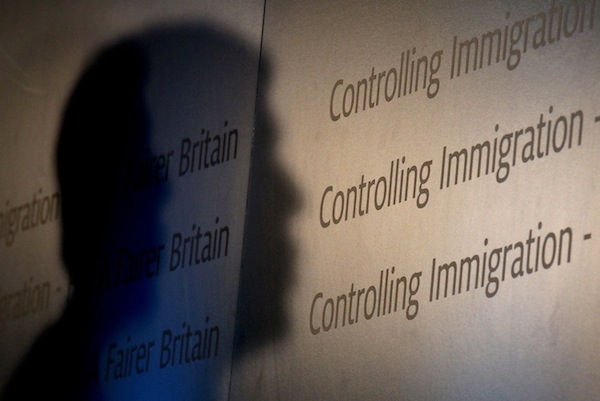It won’t actually come as a surprise to anyone living in London that the census results from the Office of National Statistics this week showed that ‘white British’ are down to 45 per cent in the capital. There are bits of the capital whose look and feel suggests that the percentage is much higher – well, the figures are from people who filled in the census forms, which isn’t quite the same thing as the actual population. Remember that cover story in The Spectator a couple of months back, based on the premise that London was practically a city-state, radically different from most other parts of the UK? Well, this census bears that contention out: the number of people living in England and Wales who were born abroad now amounts to 13 per cent nationally; in the capital, it’s 37 per cent. And plainly, many of the people here from non-indigenous backgrounds will now be second and third generation.
Immigration accounts for more than half of the population rise in the last decade but that doesn’t quite do justice to the scale of the influx: nearly four million people (3.8 million) arrived in England and Wales from abroad in that time, about half the total immigrant population. Their countries of origin were chiefly India, Poland and Pakistan, which rather gives the lie to Nick Clegg’s contention before the election that East Europeans accounted for most immigration. And as for Ed Miliband’s apology for Labour getting things ever so slightly wrong on immigration when it was in office – he hardly mentioned non-EU migration at all.
And can we bear in mind that this nearly four million are the people we know about? The estimated number of illegal immigrants is between half a million and a million. The numbers are normally hidden from view by virtue of the fact that ministers never talk about gross immigration, just net immigration (the number of arrivals, less the number of Brits leaving). But that net figure doesn’t quite reflect the fact that the arrivals may well place a greater strain on what we politely call social cohesion than those who leave, though this varies from community to community.
If you think large scale migration is over under a coalition government, you’d be wrong. In July, Croatia joins the EU, and we can expect quite a number of young people from this new state of 4.3 million to make use of their right to work and travel anywhere in the EU, including the UK. And let’s pause for a moment to reflect that it’s still the policy of this government – indeed of all the major parties – to admit Turkey to the EU – after which all 75 million odd Turks will have the same right to come here as the Poles, about half a million of whom live here.
Immigration on this scale changes everything: public services, planning, religion, politics. It puts into context Nick Boles’s insistence that planning regulations be relaxed in order to create more homes; indeed it puts the entire housing crisis into perspective. The notion that immigrants pay more in taxation than they receive in benefits may be true of some groups, but it’s a canard in general, as MigrationWatch has made clear. The demands that so many arrivals place on transport, schools, the health system and social housing are enormous; that’s rarely factored into audits of costs and benefits from immigration.
It doesn’t come as a surprise either that the number of Muslims in Britain has increased by a million; neither, given the change in demography, is surprising that the number of Christians has decreased, though it’s astonishing that it’s fallen off by four million. By comparison, atheism is doing really well: the godless constitute about a quarter of the population. That, however, has a good deal more to do with the nature of schools and public discourse than with immigration: by and large, non EU migrants are significantly more religious than native Brits.
Indeed, when you think about the things that constitute a national cultural identity – not just ethnicity, but a shared religious sensibility and a shared history – it’s hard to see contemporary Britain as having anything like the same continuity with the past as it did even a generation ago. There has always been immigration, religious groups have risen and fallen, but this change in population in a decade marks radical discontinuity. There will be many people who welcome that change, but it should at least be debated – and the extraordinary thing about immigration and British politics is the extent to which it has not been debated. Indeed, as we all know, non-racist organisations such as MigrationWatch which attempted to put the issue on the public agenda were politely shuffled off to the margins until quite recently; it’s remarkable, for instance, in BBC discussions about housing, how rarely the issue of immigration features in accounting for increased demand.
The politics of immigration are complicated; many immigrants will support Labour, though as the rise of Respect shows, it’s rash for the parties to take the allegiance of any community for granted. But for the majority population, white Brits, the consequences of large scale immigration are not particularly happy for the Tories. A poll of Ukip voters during the recent by-elections suggested that immigration is a more significant issue for them than Europe. And Ukip came second in Rotherham. Go figure.







Comments